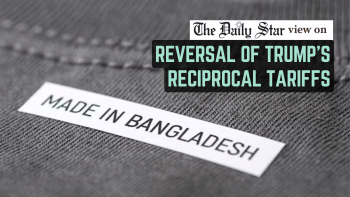A turning point for investment—if we can seize it

We're heartened by the successful conclusion of Bangladesh Investment Summit 2025 that reportedly drew in some 450 foreign investors and representatives from 40 countries. During the four-day event, two investment deals were signed, while many pledged future investments. The government has rightly expressed its intent to capitalise on the momentum. As per the organisers, a "pipeline" of potential investments will be created based on the companies and individuals who have shown interest, and a roadmap with a timeframe of 18-24 months will be drawn up to ensure the summit's promises translate into real, long-term gains. It goes without saying that the success of this much-hyped event will be determined by how well the authorities can follow through. The challenge is not just to concretise the investment commitments, but also to uphold the post-July economic reform agenda to create an enabling environment for sustainable growth.
In this connection, we want to reiterate the importance of addressing long-standing barriers to doing business that have been repeatedly flagged by experts. While there are sector-specific concerns and vulnerabilities—such as those affecting the RMG industry, which just survived (temporarily) a tariff scare triggered by the US—barriers cutting across all sectors must be addressed with priority. Participants at the summit, for instance, raised concerns about policy inconsistency, political instability, corruption, bureaucratic red tape, lack of coordination, crises of gas and electricity, and complex approval procedures. Some of these were also reflected in a recently unveiled World Bank report that highlighted Bangladesh's top five business obstacles, including its inefficient tax structure and informal economy. Many of these problems require political commitment, so political parties, too, must step up in creating the kind of environment investors need.
The fact is, Bangladesh has significant investment potential but it cannot be fully realised without addressing these underlying challenges. While the interim government's efforts in this regard have borne some fruit, much more needs to be done. At the same time, we must acknowledge the promise shown of late by some sectors. For instance, in its report, the World Bank identified four sectors—green RMG, housing for middle-class families, paint and dyes, and digital financial services—as ripe for reform. These sectors, it argues, are mature and politically feasible enough to be restructured in ways that could create millions of jobs, draw investments, and spark a ripple effect of productivity in interconnected sectors. Among them, the RMG industry deserves particular mention. As the founder of the Korean EPZ said at the summit, if overhauled and properly supported, it could become the top global apparel exporter even as we try to diversify our export basket.
To capitalise on all such promises, we need sustained efforts from the Bangladesh Investment Development Authority (BIDA) as well as targeted interventions and broad reforms from higher authorities. The recent summit was an attempt to dispel the negative perceptions many foreign investors still hold about our investment climate because of past experiences. We can project a new, reformed image through our actions going forward.


 For all latest news, follow The Daily Star's Google News channel.
For all latest news, follow The Daily Star's Google News channel. 










Comments